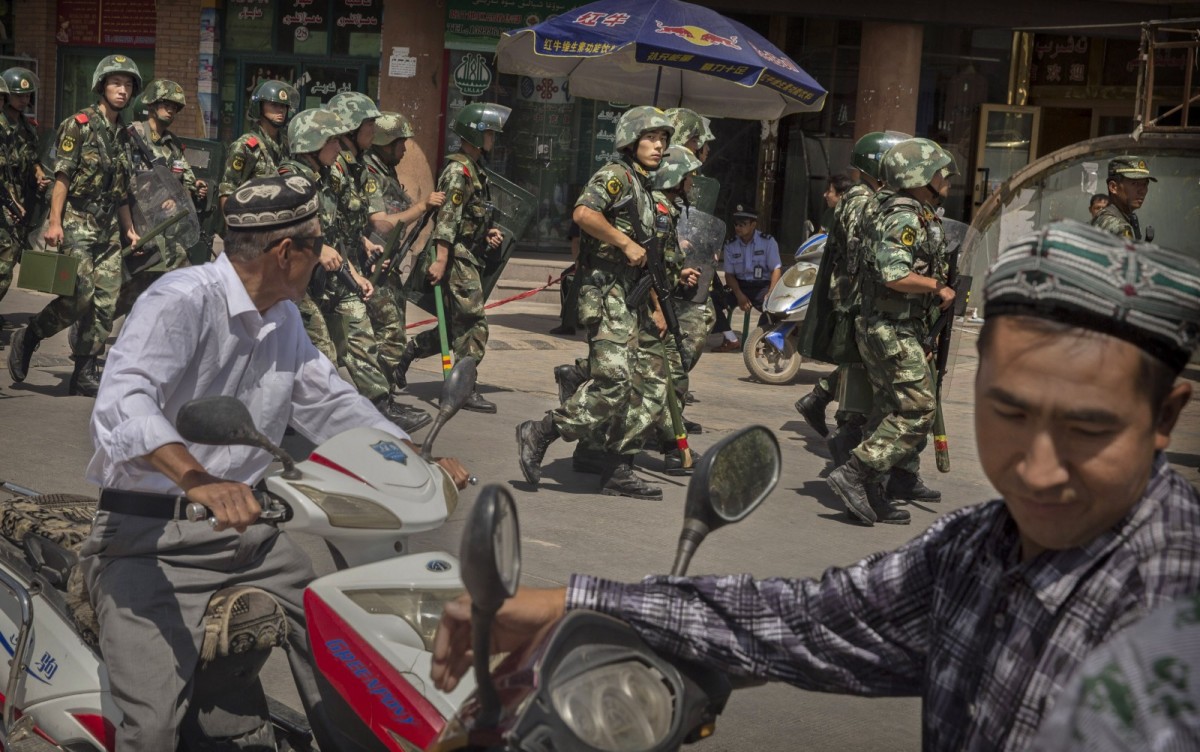A police state of historic proportion: Criminal arrests up 731 percent in Xinjiang

Xinjiang, the farthest west and most heavily Muslim jurisdiction under Beijing’s rule, has become a high-tech, all-encompassing police state with few historical parallels. Since the 2009 riots in the province’s capital city of Urumqi, the “strike hard” campaign against extremism has only struck harder, and harder. The Muslim Uyghurs have suffered mass repression as a result. As Xinjiang stands at a vital crossroads of China’s Belt and Road Initiative, its security has become an ever higher priority in Beijing.
Today, the NGO Chinese Human Rights Defenders released an analysis of publicly available government data to show just how far part of that police state goes:
- “Criminal arrests in Xinjiang accounted for an alarming 21% of all arrests in China in 2017, though the population in the XUAR [Xinjiang Uyghur Autonomous Region] is only about 1.5% of China’s total, based on the 2010 Census.”
- Arrests shot up 731 percent from 2016 to 2017, and up 306 percent when comparing the 2008-2012 period to the 2013-2017 period.
- “Though the government does not provide the data disaggregated by ethnicity, criminal punishment would disproportionately target the Uyghur Muslim group based on their percentage of the population,” Chinese Human Rights Defenders writes.
These eye-popping criminal arrest numbers don’t include those who have been sent to re-education camps — those numbers are not fully disclosed by the government. As Megha Rajagopalan of BuzzFeed news, who has reported extensively on Xinjiang, notes:
Context for this already shocking statistic — the "reeducation" camps in Xinjiang are not part of the penal system, so figures on criminal arrests don't even include the hundreds of thousands of Uighurs detained in those places, usually without documentation issued to families. https://t.co/pA1NAgLTxi
— Megha Rajagopalan (@meghara) July 25, 2018
But that doesn’t mean re-education doesn’t happen at regular prisons, too. State media is quite open about this, as the nationalist tabloid Global Times published an article on July 23 titled “Xinjiang educates, reforms imprisoned extremists in religious thought.” Excerpt:
Ma [Pinyan, a research fellow at the Xinjiang Academy of Social Sciences’ Institute of Religious Studies,] also the Vice President of the Xinjiang Prison Association, told the Global Times that they also gave basic religion training to the prison guards.
“The prison guards and other management staff need to know about religions in order to properly educate these extremists,” Ma said.
Ma added that they are still exploring a way to better educate extremists in prison since there were cases when the extremists spread their ideas in prison.
Xinjiang re-education camps hold anywhere from a few hundred thousand to over a million Uyghurs and Kazakhs, and are designed to replace Muslim beliefs with unquestioning obedience to Communist Party propaganda.
China’s ‘re-education camps’ for Muslims expand, echo Cultural Revolution
There is an active debate (much of it represented in this Chinafile conversation) among foreign scholars of China as to what they, and governments, should do about the situation in Xinjiang.
Rian Thum, a historian of Islam in China, writes on Twitter that he believes three things: That “too few China scholars are speaking up,” that “there are cases where it is better not to speak up,” and “I support the Xinjiang pledge.”
Thread on the academic self-censorship debate, amid calls for foreign China experts to speak up about mass internment of minorities in Xinjiang. Gist:
– too few China scholars are speaking up
– there are cases where it is better not to speak up
– I support the Xinjiang pledge— Rian Thum (@RianThum) July 24, 2018
The “Xinjiang pledge,” as Kevin Carrico, Lecturer in Chinese Studies at Macquarie University, writes in Chinoiresie, is: “At the start of public talks, regardless of location, one acknowledges the distressing rights situation in China today, focussing in on a point of particular concern for the speaker.” The idea is to counteract the self-censorship that academia has experienced over the past year. Carrico writes:
It may seem ridiculously simple. Yet by acknowledging this discomfiting situation, often so far removed from the comfortable space of the public lecture, thoughts will at least temporarily be moved to this other far too often unthought context and awareness will be enhanced.
Yet most importantly, simply by talking about these matters openly, and attempting to give a voice to those who are unable to speak, the suffocating cycle of silence, to which far too many of us have been accomplices at the nexus of censorship and self-censorship, will ever so slowly be broken.
A far more radical proposal comes from Jerome Cohen, one of the most experienced and respected scholars of China’s legal system, who writes: “I recommend that the U.S. Government adopt Magnitsky Act sanctions against those responsible for Xinjiang, starting with Xi Jinping.”
Various concerned countries can also act in concert outside the UN, for example excluding China from major economic and political meetings. It is a particular disgrace that Turkic, Muslim countries and their organizations have done so little to condemn China for what it is doing to their kinsmen.
For more on the situation in Xinjiang and the security risks that China is trying to contain, see these two new pieces in the Jamestown Foundation’s China Brief:






